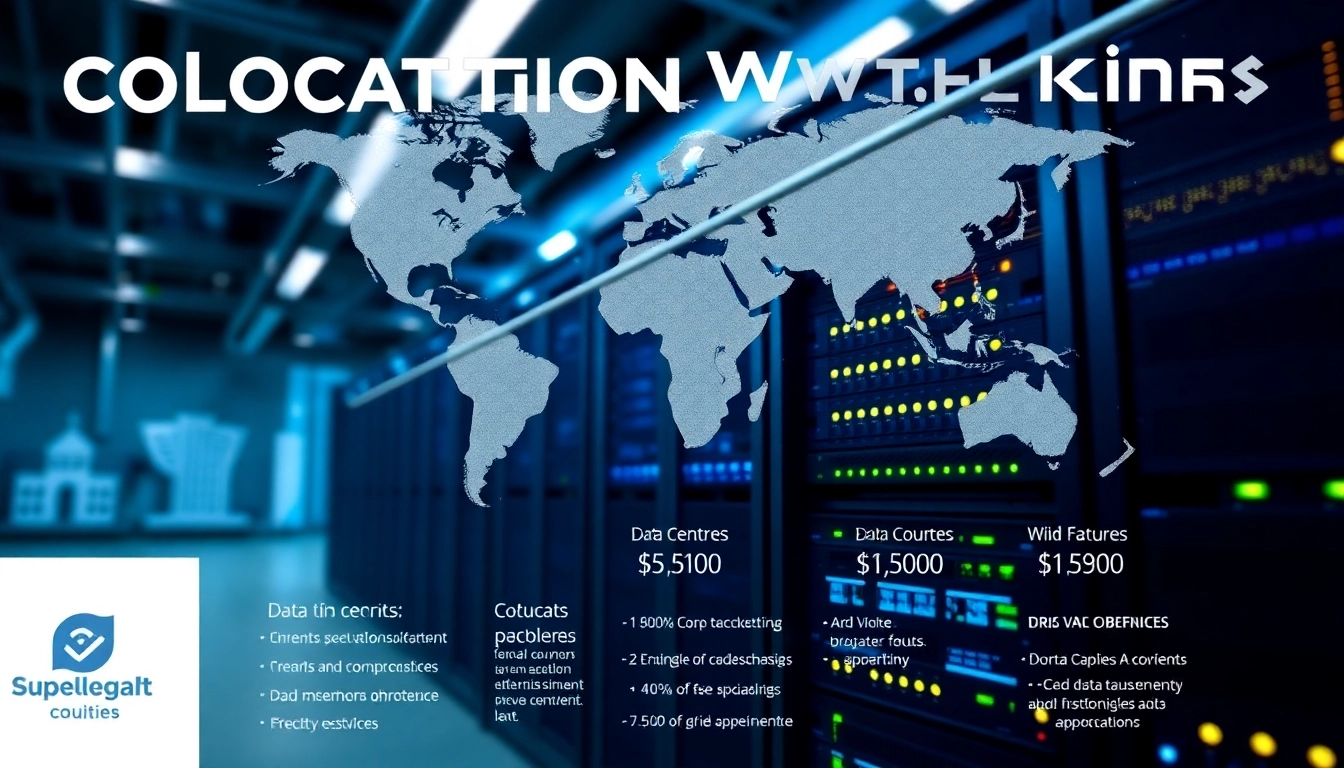Understanding Cheap Colocation
As businesses continue to rely on digital infrastructure for their operations, the importance of colocation services cannot be overstated. Cheap colocation solutions provide organizations with an efficient way to manage their IT resources without the heavy financial burden of maintaining their own data centers. But what exactly does cheap colocation mean, and how can it benefit your company? This comprehensive guide aims to shed light on these questions while offering insights into how to choose the right provider for your needs.
What is Colocation?
Colocation is a service provided by data centers where businesses can rent space for their servers and other computing hardware. Instead of hosting their servers on-site, companies can opt to place their equipment in a secure third-party data center. This not only improves reliability through high-quality infrastructure but also ensures enhanced security and connectivity.
In a colocation arrangement, businesses typically pay for the space their equipment occupies along with associated services, such as power, cooling, and network connectivity. Depending on the provider, colocation facilities may also offer additional features like managed services, backup solutions, and technical support to enhance the user experience.
Benefits of Cheap Colocation Services
Choosing a cheap colocation option can yield numerous advantages for your organization, including:
- Cost Efficiency: By outsourcing infrastructure and maintenance, companies can significantly reduce operational costs associated with running their own data centers.
- Scalability: Cheap colocation offers flexibility, allowing businesses to easily scale their operations as needs change without major investments in hardware or infrastructure.
- Improved Security: Most colocation facilities are equipped with advanced security features, like 24/7 monitoring, biometric access control, and fire suppression systems, ensuring that your data is safe.
- Reliable Connectivity: Colocation centers often provide high bandwidth and redundant network connections, ensuring that businesses maintain consistent uptime and rapid access to online resources.
Common Misconceptions about Colocation
Despite the many advantages of cheap colocation, there are several misconceptions that might deter businesses from exploring this option:
- Colocation is only for large enterprises: Many assume that colocation services are geared solely toward large corporations. However, providers cater to businesses of all sizes, making it accessible for startups and small businesses as well.
- All colocation services are expensive: While some premium providers charge high prices, a diverse array of cheap colocation options are available that still offer reliable services.
- Colocation is outdated in the cloud era: Although cloud services are popular, colocation is still a viable solution, especially for businesses needing dedicated hardware or those concerned about data sovereignty.
Factors Influencing Colocation Pricing
The pricing of colocation services can vary widely based on several factors. Understanding these can help you identify the best options for your budget and needs.
Understanding Pricing Models
There are multiple pricing models used by colocation providers. Generally, pricing may be based on:
- Rack Units (U): Companies pay for the number of rack units they occupy. A standard rack unit (1U) is typically 1.75 inches in height, meaning more units mean higher costs.
- Power Usage: Charges may also depend on the amount of power consumed, measured in kilowatts (kW). Providers may have a base rate plus additional charges for excess usage.
- Bandwidth Usage: Expenses can also arise from the amount of data you transfer. Depending on the provider, there may be overage charges once you exceed a predetermined amount.
Key Elements Affecting Costs
Several key factors influence colocation pricing and can help determine the overall value you receive:
- Location: The geographical location of the data center can impact costs. Facilities in urban areas may be pricier due to higher demand and operational costs.
- Infrastructure Quality: The level of technology and security features available will affect pricing. More advanced facilities often charge a premium for their services.
- Service Level Agreements (SLAs): Providers offering comprehensive SLAs, which outline guaranteed uptime and response times, may charge higher fees for added reliability.
How to Compare Prices Effectively
When comparing colocation providers, it’s crucial to look beyond just the price. Consider the following factors:
- Features Offered: Analyze the specific services and features included in your contract. This can encompass network redundancy, security measures, and technical support.
- Contract Terms: Pay attention to contract lengths and any penalties for early termination. Flexibility is essential, especially for growing companies.
- Reputation and Reviews: Research reviews and customer testimonials to gauge the reliability and reputation of the provider you are considering.
Finding Reliable Cheap Colocation Providers
With numerous options available, finding a trustworthy provider that offers cheap colocation can be challenging. Here are steps you can take to simplify the process.
Top Providers in 2023
Some of the notable cheap colocation providers worth considering in 2023 include:
- Sectorlink: Offering competitive prices and diverse colocation options, it caters to businesses across various sectors.
- Colocation America: Known for its scalable solutions and reliability, they offer affordable packages tailored for different business needs.
- Wholesale Internet: With ultra-low pricing and flexibility, they offer various options to meet cheap colocation demands.
What to Look for in a Provider
When selecting a cheap colocation provider, consider the following criteria:
- Security Standards: Ensure that the provider has stringent security measures in place to protect your hardware and data.
- Network Connectivity: Look for options that offer multiple network connections to ensure redundancy and avoid downtime.
- Customer Support: Reliable customer support should be available 24/7 to address any potential issues that may arise.
Customer Reviews and Recommendations
One of the best ways to unravel the truth about a colocation provider is to seek out customer feedback. Platforms such as Reddit or IT forums can provide valuable insights into the experiences of others. Always look for providers with consistent positive reviews and a reputation for reliability in service delivery.
Maximizing Value from Cheap Colocation
Once you’ve selected a cheap colocation provider, the next step is to ensure you’re maximizing the value you receive from the service.
Optimizing Server Performance
To maintain high server performance, consider these strategies:
- Regular Maintenance: Schedule regular hardware and software updates to brighten security and performance.
- Monitoring Tools: Utilize monitoring tools to keep track of server health and performance metrics.
- Load Balancing: Implement load balancing strategies to distribute workloads efficiently among servers, ensuring optimal performance.
Cost-Saving Strategies
Saving on colocation expenses does not have to compromise service quality. Here are some effective cost-saving strategies:
- Negotiate Prices: Don’t hesitate to negotiate contracts to get the best possible deal. Many providers are willing to work with you on pricing.
- Consider Hybrid Models: Explore hybrid solutions that integrate cloud services with colocation, optimizing costs while maintaining control.
Ensuring Security and Compliance
Security is paramount, especially when dealing with sensitive data. Here are ways to maintain security within a colocation environment:
- Data Encryption: Ensure that data is encrypted both in transit and at rest to protect against unauthorized access.
- Regular Audits: Conduct regular audits of your security protocols to identify vulnerabilities and improve compliance with industry standards.
Future Trends in Colocation Services
As technology continues to evolve, the colocation industry is also adapting and changing. Here are some future trends to keep an eye on:
Emerging Technologies Impacting Colocation
Technological advancements such as AI and machine learning are beginning to influence how colocation services operate. These can improve server management efficiencies and decision-making capabilities.
Market Predictions for 2025 and Beyond
Experts predict that the demand for colocation services will continue to grow, particularly as businesses expand their digital footprints and seek reliable infrastructure solutions amidst growing concerns about cybersecurity.
The Role of Sustainability in Colocation
More facilities are embracing sustainable practices, such as renewable energy sources and advanced cooling methods, aligning energy efficiency with operational needs. This trend not only benefits the environment but can also reduce costs over time.
In conclusion, the growing need for reliable, efficient, and cost-effective IT infrastructure makes cheap colocation an increasingly attractive option for many businesses. By understanding the ins and outs of colocation services, you can make informed decisions that positively impact your company’s operational efficiency and budget. Whether you are a startup or an established business, exploring your colocation options can lead to exciting opportunities for growth and optimization.

